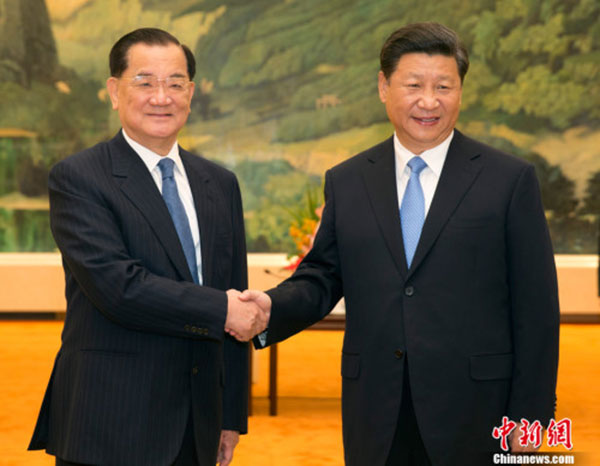Why the US is supporting Xi-Ma meeting
By Shih Chih-yu (chinadaily.com.cn) Updated: 2015-11-05 15:29
 |
|
Xi Jinping, general secretary of the Communist Party of China (CPC) Central Committee meets Lien Chan, former chairman of the Kuomintang (KMT) in Beijing on Sept 1, 2015. [Photo/Chinanews.com] |
A rare occasion on which Xi Jinping, Barack Obama and Ma Ying-Jeou agree is about to take place in Singapore, as the meeting between Xi and Ma is intended to balance the growing "independence" sentiment in Taiwan, something that is bothering all three political leaders; for different reasons.
The popular impression that Xi is trying to help Ma and the ruling Kuomintang to regroup in a battle for Taiwan leadership election in 2016 is problematic.
Most actually believe that the Kuomintang is destined to lose. Since Ma's leadership cannot bring a certain result, how can Xi base his brave decision to meet with Ma on uncertainty?
Rather, the opposite consideration is more likely, that the "pro-independence" Tsai Ing-wen is going to win by a landslide at the polls, so there is need to cope with her determination to politically estrange the mainland. This matches Ma's wish to control the potential danger of Tsai inciting her constituency into a drastic demand for legalizing "independence".
Ma wishes nothing more than the continuation of the status quo even if, as seems likely, Tsai comes to power next May.
The shared aversion of Ma and Xi to Taiwan "independence" aside, Ma prefers to stay with Washington, whose suspicion toward either provocative independence or realignment across the Taiwan Straits cannot be overestimated.
This brings us to the key question – Why has Washington appeared more enthusiastic than expected toward the cross-Straits meeting?
Three days before the announcement of the meeting by Ma's office, Washington had already offered its approval. Retired US officials who used to work on cross-Straits issues have one after another expressed their pleasant surprise at the announcement.
Hasty columnists as well as underdog campaigners speculate a change of mood in the United States, seeing it as now ready to choose the Kuomintang over Tsai's Democratic Progressive Party.
- Xi Jinping rencontrera le dirigeant de Taiwan à Singapour
- Singapore plays positive role in ties with Taiwan
- Xi to meet Taiwan leader in Singapore
- Event showcases best of Taiwan's creations
- Taiwan elections could hurt tourism
- Official urges right path for mainland-Taiwan relations development
- Taiwan raises cap on mainland independent tourists

I’ve lived in China for quite a considerable time including my graduate school years, travelled and worked in a few cities and still choose my destination taking into consideration the density of smog or PM2.5 particulate matter in the region.











